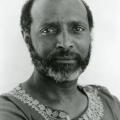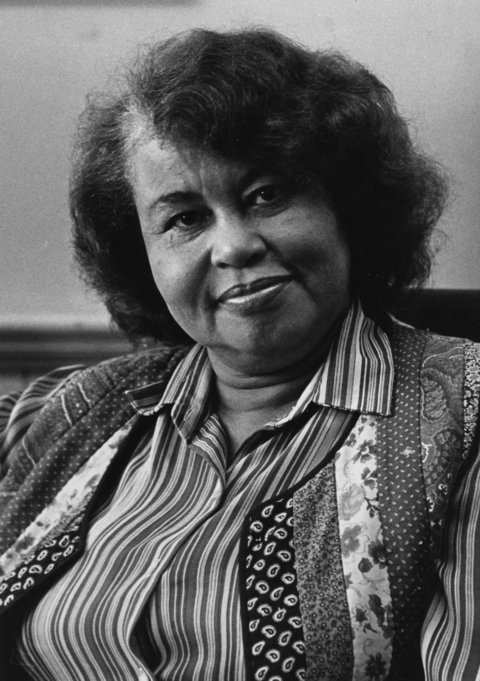135. Mastering Ceremonies: Sylvia Wynter
Sylvia Wynter offers a bold and provocative assessment of the role of the humanities in understanding humankind.
Themes:
• S. Wynter, “We Must Learn to Sit Down Together and Talk About a Little Culture: Reflections on West Indian Writing and Criticism,” Jamaica Journal 2 (1968), 23-32.
• S. Wynter, “Jonkonnu in Jamaica: Towards the Interpretation of Folk Dance as a Cultural Process,” Jamaica Journal 4 (1970), 32-47.
• S. Wynter, “On Disenchanting Discourse: ‘Minority’ Literary Criticism and Beyond,” Cultural Critique (1987), 207-44.
• S. Wynter, “Beyond the World of Man: Glissant and the New Discourse of the Antilles,” World Literature Today 63 (1989), 637-47.
• S. Wynter, “The Ceremony Must be Found: After Humanism,” Boundary 2 (1984).
• S. Wynter, Do Not Call Us Negros: How “Multicultural” Textbooks Perpetuate Racism (San Francisco: 1990).
• S. Wynter, “1492: A New World View,” in V. Hyatt, R. Nettleford (eds), Race, Discourse, and the Origin of the Americas: a New World View. (Washington DC: 1995).
• S. Wynter, “No Humans Involved: An Open Letter To My Colleagues,” CAAS Research Review 1 (1994), 1-17.
• S. Wynter, “Columbus, the Ocean Blue, and Fables That Stir the Mind: to Reinvent the Study of Letters,” in B. Cowan and J. Humphries (eds), Poetics of the Americas: Race, Founding, and Textuality (Baton Rouge: 1997), 141-63.
• S. Wynter, We Must Learn to Sit Down Together and Talk About a Little Culture: Decolonizing Essays 1967-1984 (2012).
• S. Wynter, Oral History, Stanford Historical Society Oral History Program Interviews, SC0932 (Stanford: 2020).
---
• Journal of West Indian Literature 10 (2001): special issue devoted to Sylvia Wynter.
• A. Kamugisha, Beyond Coloniality: Citizenship and Freedom in the Caribbean Intellectual Tradition (Bloomington: 2019).
• D. Marriot, “Inventions of Existence: Sylvia Wynter, Frantz Fanon, Sociogeny, and ‘the Damned’,” New Centennial Review 11 (2011), 45-89.
• E.A. Parker, “Human as Double Bind: Sylvia Wynter and the Genre of ‘Man’,” Journal of Speculative Philosophy 32 (2018), 439-49.
• D. Scott, “The Re-Enchantment of Humanism: An Interview with Sylvia Wynter,” Small Axe 8 (2000), 119-207.






Comments
Renaissance Europe + Marx + your podcast
Four things:
1. That is an interesting idea she had about European culture always defining itself in terms of some other. Although two problems I have with it. One, it implies too much unity for my liking of the Medieval era. Like, how they conceptualised God was different across both time and space (I mean, just see the split between west and east Christendom). The other problem is that it seems to have huge Islamic and Jewish and Pagan shaped holes in it. There is no way, especially around the crusade era that Europeans did not define themselves against Islam, no way. And it is basically explicit in Christian theology that Christians define themselves as not (religious specifically) Jews, seeing themselves as inheritors of a new covenant succeeds/fulfils etc (maybe not phrased in the right way, I don't know the specifics of Medieval covenant theology but you know what I am talking about) the old one. And aren't pagans a pretty big other they defined themselves against to as well?
Also, since we are covering the renaissance/reformation right now, what is your take on this paradox she talked about and specifically "degodding" during the renaissance? Would you say this lines up with your understanding?
2. I don't think she is giving Marxism a fair assessment. There have been many Marxists that argue against an economic determinist interpretation of Marx. I think all the Marxists we have covered in this series would also deny that interpretation of Marx. Maybe Marx himself didn't focus on culture as much as economic, but Engels notes in disclaimers in Socialism: Utopian and Scientific that the economic aspects don't exhaust the totality of society, that was just the focus they were taking in a lot of their works. Does she get more into this anywhere, and how if so?
3. Related to Marx, I was reminded of Ludwig Feuerbach when she said that Medieval Europeans defined themselves against God. The main idea that Feuerbach is associated with, thanks to Marx, is that Imago Dei was essentially backwards. He thought that we made God in our image basically. In his Essence of Christianity he argued that when we think about God, we are thinking about the "human species-essence" (his terminology) in an alienated form. Take any attribute that is said of God. All loving, all powerful, all knowing etc. He says these attributes actually apply to the human species-essence, we have just abstracted them and applied them to an external object. Hence his famous claim that theology is anthropology. That is a quick and dirty sketch of the idea anyway. Does Sylvia ever comment on Feuerbach? It seems in a way a more fulling out on how Medieval Christians defined themselves against God as other (by othering themselves and them returning to themselves as an image of that other).
4. That claim about multiculturalism is very interesting. While not usually under the name of multiculturalism, a lot of book/other material that I have seen that try to add non western philosophy into a subject, unless the book is specifically about that non western tradition's treatment of the subject, has always seem like a side line to the main content (I mean structure wise, not necessarily depth of content). Added on, like she says. Isn't this podcast committing the same sin though? There is the main western series and non western traditions treated as a separate added on thing. Like for the main line, you have many different sections dedicated to the "European" tradition, but non western traditions are all a single series themselves (well so far anyway, I know you eventually want to do later india and later china but the point still stands - compare how it is all packaged, where classical india is a single series, while ancient greek and later antiquity are two separate series, and that unless you have other ideas I get the impression later india will be a single series compared to the equivalent in the western series that has Medieval, Byzantine, Renaissance/Reformation and the ones to be added later. This isn't me saying you have done anything wrong btw, I get how we got to this point from where you started. Still, it is an unfortunate accident that things have happened this way. If we were to start again with her critique of multiculturalism in mind, how would we restructure the history of philosophy would you say? Where we try to have everything integrated (well in as far as history would allow that anyway, I don't know how to handle traditions that are very far apart like ancient China and ancient Greece)?
Sorry for the lengthy comment, one idea lead to another with this haha.
In reply to Renaissance Europe + Marx + your podcast by Andrew
Wynter
Wow thanks for that detailed response to this episode! Here are a few thoughts in reply to your points; I should say up front that I have not by any stretch of the imagination read everything by Wynter (even leaving aside the titanic unpublished manuscript) though I did go through the whole collection of her essays so I got a pretty broad idea. She's a really hard read though, as we mentioned, so I can't claim to have understood every move. With that said:
In reply to Renaissance Europe + Marx + your podcast by Andrew
Separate strands of philosophy
There's a good radio interview with Sylvia Wynter on the show Soundings in 1981 (https://blogs.lib.unc.edu/soundings/1981/11/22/afro-american-culture-an…) where she talks about how the Black perspective that developed in the 60s (and before that as well), was one which could bring a new way of looking at things that couldn't be had before, neither when each culture and society was "going about in their own orbits" (as she says, extending a metaphor on astronomy, cultural relativity and history), nor during the period of colonialism when Europeans following Columbus created a globally extended (hierarchical) world order. She goes into this as well in her "Quincentary: Caribbean Perspectives) entry in volume 2 of the 1992 Columbus Encyclopedia (cited below) where she references Théophile Obenga and his claim that just as the Renaissance humanists went back to the Classics, Africans (and, as Wynter states, all humans) must go back to Ancient Egypt as well as Blombos and beyond to create a new story for our unified yet ecumenically human species (in all its plurality). She gets into this as well in a conference recording with Errol Hill focused on Carnival (Wynter first appears on Part 1 Tape 1 Side B 05:12 minute mark. Wynter, S. & Hill, Errol. (1983). Part 1: https://searchworks.stanford.edu/view/gx100wj6001. Part 2: https://searchworks.stanford.edu/view/cy176gy1589).
Wynter, S. (1992). “Anghiere, Pietro Martire D,’” “Quincentenary: Caribbean Perspectives,” and “Sevilla la Nueva”. In S.A. Bedini (Ed.), The Christopher Columbus Encyclopedia Volume 1 & 2 (pp. 21-23 in V1; 574-577, 611-615 in V2 respectively). New York, NY: Simon & Schuster.
Oh, almost forgot to mention…
Oh, almost forgot to mention the islamic world in my original comment! I didn't mention it in the 4th point, but I meant to bring it up later in my comment because I think it is a great example for how a non western centered reconstructed podcast would look, with how well it was integrated into the main series
Add new comment